Module 2 Experiences Unit 1 课件(共36张PPT,含内嵌音频) 外研版八年级英语下册
文档属性
| 名称 | Module 2 Experiences Unit 1 课件(共36张PPT,含内嵌音频) 外研版八年级英语下册 | 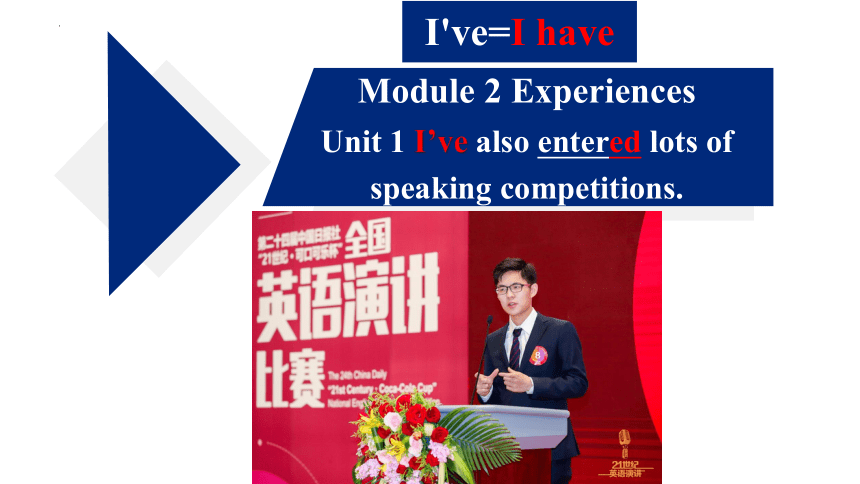 | |
| 格式 | pptx | ||
| 文件大小 | 19.2MB | ||
| 资源类型 | 教案 | ||
| 版本资源 | 外研版 | ||
| 科目 | 英语 | ||
| 更新时间 | 2024-12-29 16:33:00 | ||
图片预览

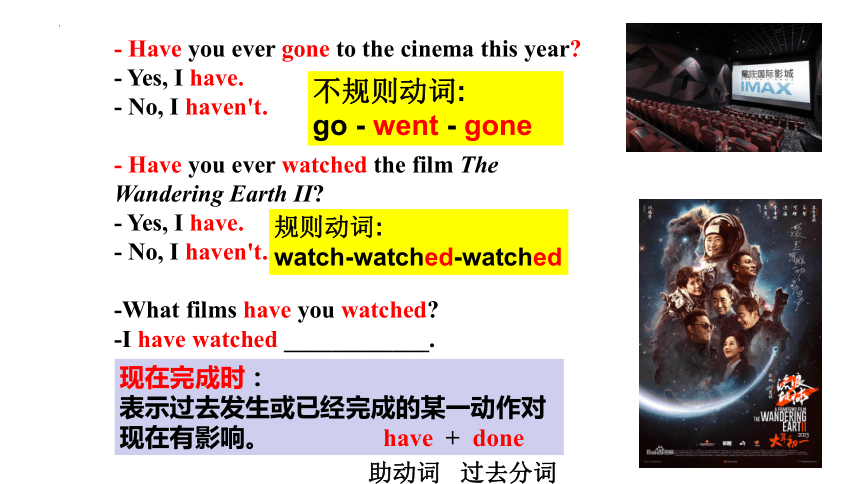
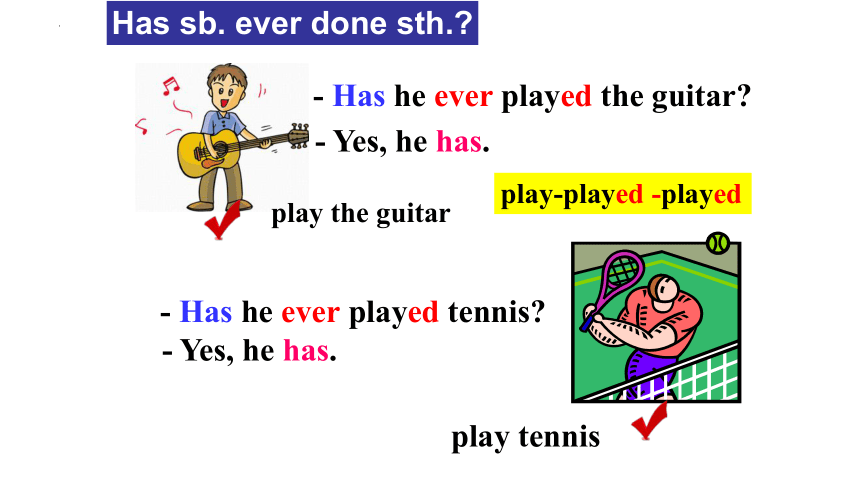
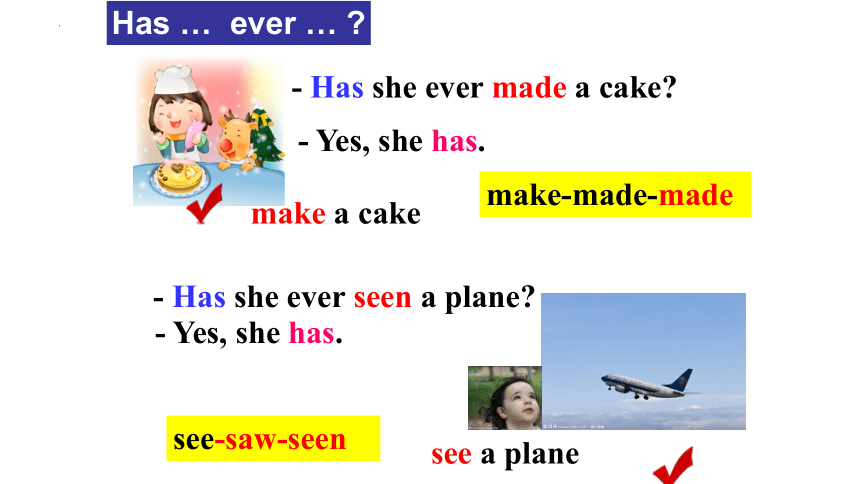

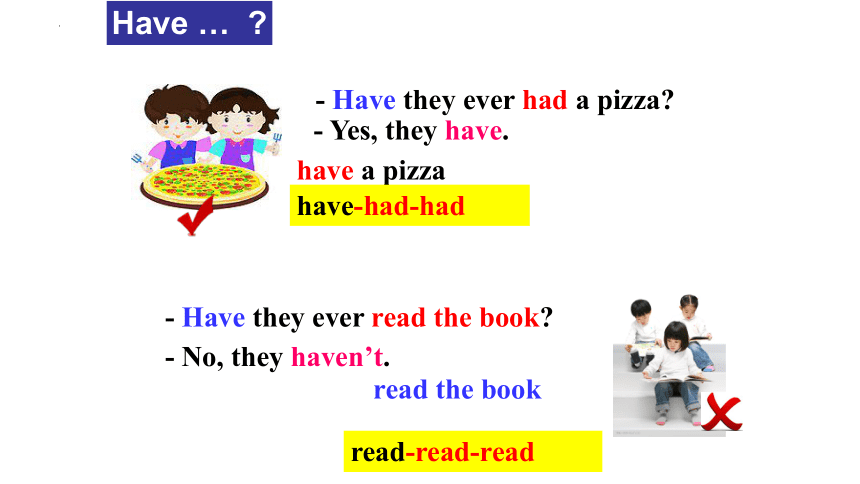
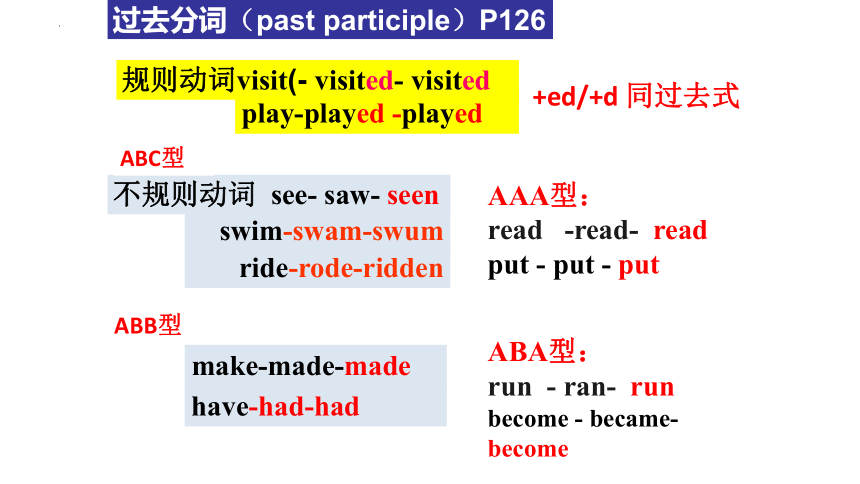
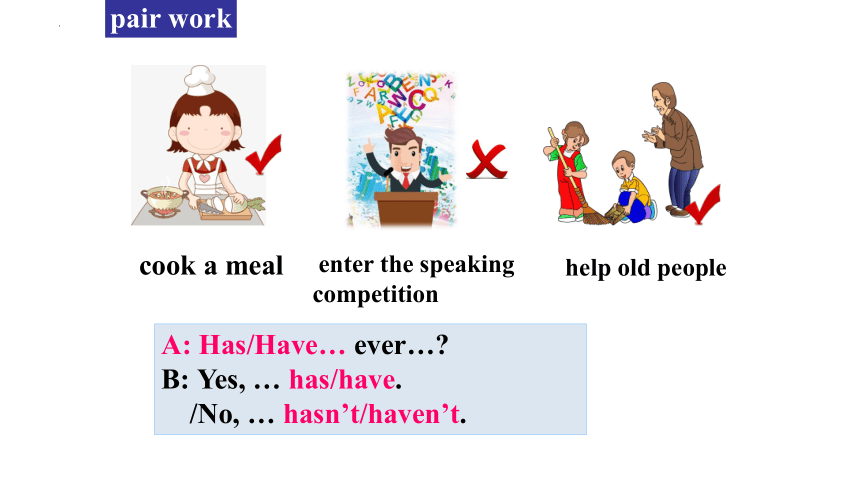
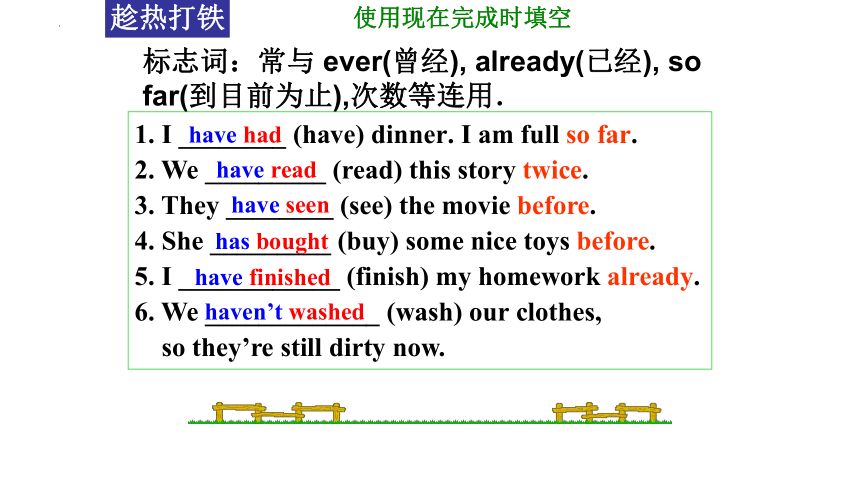
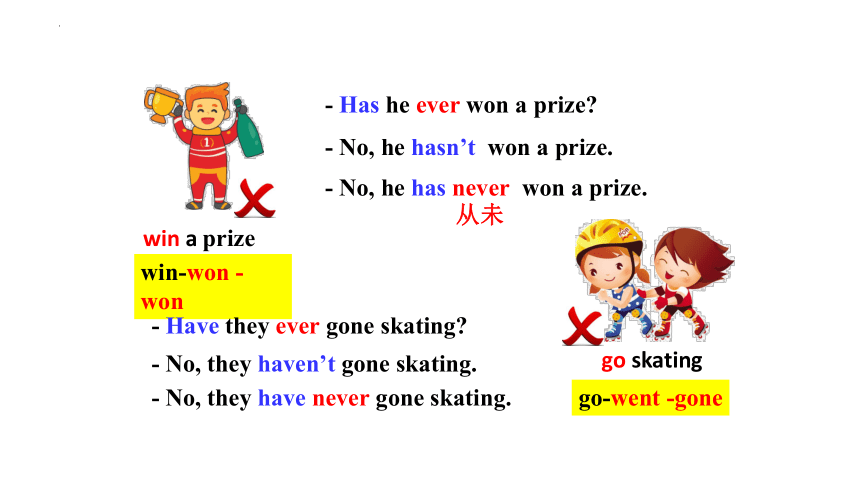

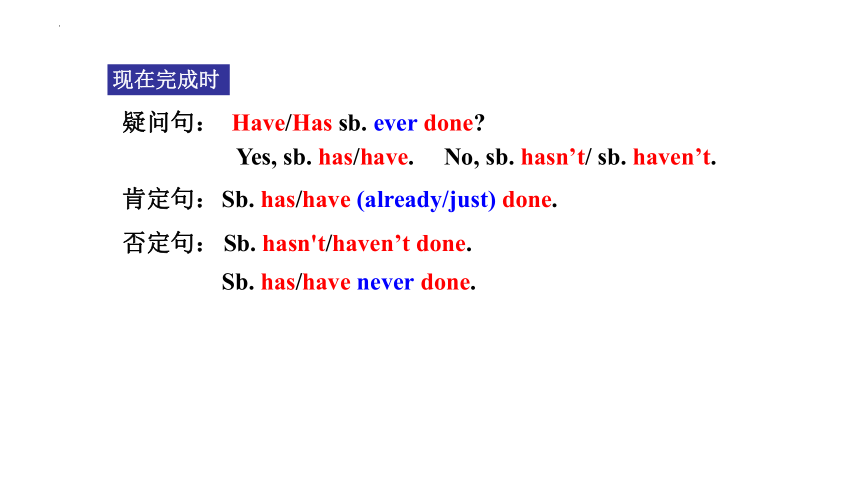
文档简介
(共36张PPT)
Module 2 Experiences
Unit 1 I’ve also entered lots of speaking competitions.
I've=I have
- Have you ever gone to the cinema this year
- Yes, I have.
- No, I haven't.
- Have you ever watched the film The Wandering Earth II
- Yes, I have.
- No, I haven't.
-What films have you watched
-I have watched ____________.
不规则动词:
go - went - gone
规则动词:
watch-watched-watched
现在完成时:
表示过去发生或已经完成的某一动作对现在有影响。 have + done
助动词
过去分词
- Has he ever played the guitar
- Yes, he has.
- Has he ever played tennis
- Yes, he has.
play the guitar
play tennis
play-played -played
Has sb. ever done sth.
- Has she ever made a cake
- Yes, she has.
- Has she ever seen a plane
- Yes, she has.
make-made-made
see-saw-seen
make a cake
see a plane
Has … ever …
- Has he ever swum in the sea
- No, he hasn’t.
- Has she ever ridden a horse
ride a horse
ride-rode-ridden
- No, she hasn’t.
swim in the sea
swim-swam-swum
Has …
read the book
- Have they ever had a pizza
- Yes, they have.
- Have they ever read the book
have a pizza
have-had-had
read-read-read
- No, they haven’t.
Have …
play-played -played
规则动词visit(- visited- visited
不规则动词 see- saw- seen
make-made-made
ride-rode-ridden
swim-swam-swum
have-had-had
过去分词(past participle)P126
ABB型
ABC型
AAA型:
read -read- read
put - put - put
ABA型:
run - ran- run
become - became-become
+ed/+d 同过去式
A: Has/Have… ever…
B: Yes, … has/have.
/No, … hasn’t/haven’t.
cook a meal
help old people
enter the speaking competition
pair work
1. I ________ (have) dinner. I am full so far.
2. We _________ (read) this story twice.
3. They ________ (see) the movie before.
4. She _________ (buy) some nice toys before.
5. I ____________ (finish) my homework already.
6. We _____________ (wash) our clothes,
so they’re still dirty now.
have had
have read
have seen
has bought
have finished
haven’t washed
使用现在完成时填空
趁热打铁
标志词:常与 ever(曾经), already(已经), so far(到目前为止),次数等连用.
win a prize
win-won -won
- Has he ever won a prize
- No, he hasn’t won a prize.
go skating
go-went -gone
- Have they ever gone skating
- No, they haven’t gone skating.
从未
- No, he has never won a prize.
- No, they have never gone skating.
swim in the sea
sweep the floor
travel by plane
cook a meal
swim-swam -swum
sweep-swept -swept
travel-travelled -travelled
cook-cooked-cooked
A: Has/Have… ever…
B: No, … hasn’t /haven’t ...
No, … has/have never...
现在完成时
疑问句:
Have/Has sb. ever done
Yes, sb. has/have.
No, sb. hasn’t/ sb. haven’t.
肯定句:
Sb. has/have (already/just) done.
否定句:
Sb. hasn't/haven’t done.
Sb. has/have never done.
1. Lingling has visited / hasn’t ever visited the US.
2. Betty has asked / hasn’t asked her parents.
3. Lingling has travelled / hasn’t travelled by plane.
How did Lingling feel about travelling by plane
Listen and choose the correct answer. P10
Lingling felt it was exciting but she was quite tired.
Listen and choose the correct answer.
1. Lingling hasn't visited .
2. Lingling has travelled by .
A.
B.
C.
A. Bored. B. Happy. C. Excited .
A.
B.
3.How did Lingling feel after travelling ?
C.
Listening 1
4. What are Lingling doing now
A. She is entering a reading competition.
B. She is entering a writing competition.
C. She is entering a speaking competition.
5. What has Lingling won before
A. She has won some prizes.
B. She has won nothing.
C. She has won some money.
Tip:Before listening, underline the key words.
Listening 2
Part 1
6. Who has entered lots of speaking competitons
A. Lingling B. Betty C. Tony
7. Has Tony won some prizes
A. No, he hasn't. B. Yes, he has. C. Not mentioned.(提到)
8. In the end, what competiton did Tony decide to enter
A. A reading competition.
B. A writing competiton.
C. A speanking competition.
Tip:Before listening, underline the key words.
Listening 2
Part 2
Listening III
Listen and complete the table.
Name Experiences
1. . hasn't won any prizes before.
has 2. wanted to go on a dream holiday.
Tony has entered a lot of 3. competitions.
hasn't won prizes.
hasn't 4 a lot.
Prize The first prize is a 5____________
1.A. Lingling B. Tony C. Someone
2.A. often B. always C. never
3.A.writing B. singing C. speaking
4.A. travelled B. spoken C. dreamed
5.A. Money B. holiday C. book
Lingling
always
speaking
book
travelled
Listening 3
Has Lingling had a dream holiday before
No, she can’t afford it.
afford sth./ to do sth.
请小组成员彼此询问曾经的经历(如:做过什么/去过哪 )
A: Have you ever ...
B: Yes, I have. I have ever ...
/No, I haven't. I haven't ever...
C: Has he/she ever ...
D: Yes, he/she has. He/ She has ever ...
No, he/she hasn't. He/ She hasn't ever ...
Have you (ever)
Yes, I have.
I have (ever) ...
No, I haven’t.
I haven't (ever)...
traveled/travelled by plane
cooked meals
washed your clothes
swum in the sea
eaten hamburgers
...
Group work
Talk time
Read and think
1.Do you agree to stop trying
编造一个
2.To win a prize, do you agree to make up a travelling story
Read and think
3. What did Tony think the first prize will be at first
Tony thought the first prize will be a trip around the world for 80 days.
4. If you were Tony, will you still enter the writing competition
dream
prizes
competition
afford
pity
invited
1 minute
Practice
根据汉语意思完成句子
1.我也参加过许多演讲比赛。
I’ve also _______ lots of _________ ___________.
2.我的同学凯特在写作比赛中获得了一等奖。
My classmate, Kate, ________ ________ _______ __________in the writing competition.
3.这个女孩曾经乘飞机到中国旅行过吗?
________ the girl ________ _________ _________ China _________ plane
4.我一直想过一个理想的假期。
I’ve always __________to_________ ___________ a _________ holiday
entered
speaking competitions
won the first
prize
Has ever travelled to
by
wanted go on
dream
Phrases
1、参加比赛
2、演讲比赛
3、提高你的口语
4、获奖
5、一等奖
6、买不起
7、停止做某事
8、考虑
9、写作
10、编写
11、邀请某人做某事
enter a competition
a speaking competition
improve your speaking
win a prize
the first prize
can’t afford sth. / to do sth.
stop doing sth.
think about
write about
make up
invite sb. to do sth.
The more you experience,
the more wisdom you will gain.
单项填空
1.I _____ always wanted to travel around the world.
A. am B. do C. have D. shall
2. Our teacher helped us ________ a plan for this competition.
A. make B. made C. to making D. making
3. —Have you ______ seen that film —Yes, I have.
A. ever B. some C. any D. often
4. She bought a book __________ Around the World in 80 Days.
A. calling B. called C. call D. to call
C
A
A
B
趁热打铁
1. Have you ever …
2. competition 注意拼写(+S)
3. prize 可以加复数 prize(s)
4. win-won-won win sth./ beat sb.
5. dream-dreamed-dreamed
dream- dreamt- dreamt
6.afford sth. afford to do sth.
I can’t afford it. 我负担不起。
7.&8. 注意两个词组中文
make up 编造;捏造;弥补
9.invite sb. to do sth./ to sp.(去某地)
n.(an) invitation
Language in use
其结构形式为“主语+have/has+过去分词” 构成。
过去分词分规则变化与不规则变化。
be — was / were —
do — did —
eat — ate —
go — went —
see — saw—
fly —flew —
come — came—
(2)过去分词不规则变化分‘‘AAA’’,‘‘ABB’’,‘‘ABC’’,‘‘AAB’’,‘‘ABA’’
find — found —
have — had —
beat — beat —
take — took —
buy — bought —
put — put —
been
done
eaten
gone
seen
flown
come
found
had
beaten
taken
bought
put
书本P126-129
1.—Anna, have you (曾经)seen China's Got Talent 《中国达人秀》)?
—Of course.I it last weekend. (see)
2.— Have you seen Bill
— Yes, he to the library.
A. has gone B. had gone C. has been
3.He ________the book already. (read)
4. ____ you ever _____Beijing Roast Duck before (try)
saw
C
has read
Have tried
ever
have/ has been to + 某地 “去过某地” 人已回来;
have/ has gone to + 某地 “去了某地” 人不在此。
Language in use
3. But I can’t afford it.
afford v. (有财力)买得起,付得起。
通常与can, could, be able to连用。多用于否定句或疑问句中;常结构为afford to do sth.
Translate:
1.他们买不起一幢大房子。
They __________________________ a big house .
2.The houses are so expensive that he can’t _______(承担得起) to buy one.
3.Granny told me that her family could not even _______ (afford/buy)a bike at that time.
couldn't afford to buy
afford
afford
Language in use
4. I’ve stopped trying now.
stop doing sth. 停止做某事(停止正在做的事情)
stop to do sth. 停下来去做某事(停止正在做的事情去做另一件事情)
Translate:
1.那两个女孩一见到我就停止了讲话。
The two girls ________________when they saw me.
2.那两个女孩一见到我就停下来和我讲话。
The two girls _____________________when they saw me.
stopped talking
stopped to talk to me
Language in use
5. You can make it up.
make up表示“创造,编造”“组成,构成”
Translate:
1.整个故事是虚构出来的。
The whole story ____________.
2.这三个段落组成了一篇文章。
The three paragraphs __________________.
make up a passage
is made up
Language in use
6.I will invite you to come with me.
invite v. 邀请 invite sb to do sth.
n. 邀请 invitation
Translate:
1.我被邀请在会上讲话。
I was invited __________________.
2.没有邀请函是不允许进入的。
You are not allowed to go in __________________.
to speak in the meeting
without invitation
Grammar
I went to Beijing last summer holiday.
上个暑假,我去了北京。(一般过去时)
常见提示词:last month/year/weekend… yesterday…/ago
I have been to Beijing twice. I know a lot about it.
我已经去过北京两次了。(现在完成时)
提示:次数many times/ once / twice …before
基本句型:
It/He/She has+done sth. (否定句 has not/hasn’t)
I/We/You/They +have done sth. (否定句 have not/haven’t)
疑问句 助动词 Have/Has 提前到句首 Have/Has sb. done sth
Grammar(语法)
现在完成时(the Present Perfect Tense):
表示过去发生的动作对现在的影响.
Compare(对比)
1.I bought a new book yesterday.
I have (already) bought a new book.
2.I visited Beijing last weekend.
I have (ever) visited Beijing.
常与 ever(曾经), already(已经) 等连用.
构成:(助动词) have / has + p.p. (过去分词)
U1课时特训知识点
1. ago/last night等,只用于过去时; 现在完成时可以用 before
I saw Betty last night/10 mins ago.
I have never seen Betty before.
2.in 10 days;this summer vacation 结合语境 将来时
3. 语境中有“已经”的意思,则时态选择现在完成时
或题干中有明显的助动词 has/have +done
现在完成时一般疑问句,助动词提前
Have/ Has sb. done sth
仅仅描述过去发生的事情,则时态选择一般现在时
Experience is the fruit of years.
经验是年岁的果实。
—Nichalas Breton尼古拉斯·布雷顿
Experience is the mother of knowledge.
经验是知识之母。
—Aristotle亚里士多德
Experience is by industry achieved,and perfected by the swift course of time.
一个人的经验是在刻苦中得到,也只有岁月的磨练才能使它成熟。
—Shakespeare莎士比亚
Beautiful sentences
Module 2 Experiences
Unit 1 I’ve also entered lots of speaking competitions.
I've=I have
- Have you ever gone to the cinema this year
- Yes, I have.
- No, I haven't.
- Have you ever watched the film The Wandering Earth II
- Yes, I have.
- No, I haven't.
-What films have you watched
-I have watched ____________.
不规则动词:
go - went - gone
规则动词:
watch-watched-watched
现在完成时:
表示过去发生或已经完成的某一动作对现在有影响。 have + done
助动词
过去分词
- Has he ever played the guitar
- Yes, he has.
- Has he ever played tennis
- Yes, he has.
play the guitar
play tennis
play-played -played
Has sb. ever done sth.
- Has she ever made a cake
- Yes, she has.
- Has she ever seen a plane
- Yes, she has.
make-made-made
see-saw-seen
make a cake
see a plane
Has … ever …
- Has he ever swum in the sea
- No, he hasn’t.
- Has she ever ridden a horse
ride a horse
ride-rode-ridden
- No, she hasn’t.
swim in the sea
swim-swam-swum
Has …
read the book
- Have they ever had a pizza
- Yes, they have.
- Have they ever read the book
have a pizza
have-had-had
read-read-read
- No, they haven’t.
Have …
play-played -played
规则动词visit(- visited- visited
不规则动词 see- saw- seen
make-made-made
ride-rode-ridden
swim-swam-swum
have-had-had
过去分词(past participle)P126
ABB型
ABC型
AAA型:
read -read- read
put - put - put
ABA型:
run - ran- run
become - became-become
+ed/+d 同过去式
A: Has/Have… ever…
B: Yes, … has/have.
/No, … hasn’t/haven’t.
cook a meal
help old people
enter the speaking competition
pair work
1. I ________ (have) dinner. I am full so far.
2. We _________ (read) this story twice.
3. They ________ (see) the movie before.
4. She _________ (buy) some nice toys before.
5. I ____________ (finish) my homework already.
6. We _____________ (wash) our clothes,
so they’re still dirty now.
have had
have read
have seen
has bought
have finished
haven’t washed
使用现在完成时填空
趁热打铁
标志词:常与 ever(曾经), already(已经), so far(到目前为止),次数等连用.
win a prize
win-won -won
- Has he ever won a prize
- No, he hasn’t won a prize.
go skating
go-went -gone
- Have they ever gone skating
- No, they haven’t gone skating.
从未
- No, he has never won a prize.
- No, they have never gone skating.
swim in the sea
sweep the floor
travel by plane
cook a meal
swim-swam -swum
sweep-swept -swept
travel-travelled -travelled
cook-cooked-cooked
A: Has/Have… ever…
B: No, … hasn’t /haven’t ...
No, … has/have never...
现在完成时
疑问句:
Have/Has sb. ever done
Yes, sb. has/have.
No, sb. hasn’t/ sb. haven’t.
肯定句:
Sb. has/have (already/just) done.
否定句:
Sb. hasn't/haven’t done.
Sb. has/have never done.
1. Lingling has visited / hasn’t ever visited the US.
2. Betty has asked / hasn’t asked her parents.
3. Lingling has travelled / hasn’t travelled by plane.
How did Lingling feel about travelling by plane
Listen and choose the correct answer. P10
Lingling felt it was exciting but she was quite tired.
Listen and choose the correct answer.
1. Lingling hasn't visited .
2. Lingling has travelled by .
A.
B.
C.
A. Bored. B. Happy. C. Excited .
A.
B.
3.How did Lingling feel after travelling ?
C.
Listening 1
4. What are Lingling doing now
A. She is entering a reading competition.
B. She is entering a writing competition.
C. She is entering a speaking competition.
5. What has Lingling won before
A. She has won some prizes.
B. She has won nothing.
C. She has won some money.
Tip:Before listening, underline the key words.
Listening 2
Part 1
6. Who has entered lots of speaking competitons
A. Lingling B. Betty C. Tony
7. Has Tony won some prizes
A. No, he hasn't. B. Yes, he has. C. Not mentioned.(提到)
8. In the end, what competiton did Tony decide to enter
A. A reading competition.
B. A writing competiton.
C. A speanking competition.
Tip:Before listening, underline the key words.
Listening 2
Part 2
Listening III
Listen and complete the table.
Name Experiences
1. . hasn't won any prizes before.
has 2. wanted to go on a dream holiday.
Tony has entered a lot of 3. competitions.
hasn't won prizes.
hasn't 4 a lot.
Prize The first prize is a 5____________
1.A. Lingling B. Tony C. Someone
2.A. often B. always C. never
3.A.writing B. singing C. speaking
4.A. travelled B. spoken C. dreamed
5.A. Money B. holiday C. book
Lingling
always
speaking
book
travelled
Listening 3
Has Lingling had a dream holiday before
No, she can’t afford it.
afford sth./ to do sth.
请小组成员彼此询问曾经的经历(如:做过什么/去过哪 )
A: Have you ever ...
B: Yes, I have. I have ever ...
/No, I haven't. I haven't ever...
C: Has he/she ever ...
D: Yes, he/she has. He/ She has ever ...
No, he/she hasn't. He/ She hasn't ever ...
Have you (ever)
Yes, I have.
I have (ever) ...
No, I haven’t.
I haven't (ever)...
traveled/travelled by plane
cooked meals
washed your clothes
swum in the sea
eaten hamburgers
...
Group work
Talk time
Read and think
1.Do you agree to stop trying
编造一个
2.To win a prize, do you agree to make up a travelling story
Read and think
3. What did Tony think the first prize will be at first
Tony thought the first prize will be a trip around the world for 80 days.
4. If you were Tony, will you still enter the writing competition
dream
prizes
competition
afford
pity
invited
1 minute
Practice
根据汉语意思完成句子
1.我也参加过许多演讲比赛。
I’ve also _______ lots of _________ ___________.
2.我的同学凯特在写作比赛中获得了一等奖。
My classmate, Kate, ________ ________ _______ __________in the writing competition.
3.这个女孩曾经乘飞机到中国旅行过吗?
________ the girl ________ _________ _________ China _________ plane
4.我一直想过一个理想的假期。
I’ve always __________to_________ ___________ a _________ holiday
entered
speaking competitions
won the first
prize
Has ever travelled to
by
wanted go on
dream
Phrases
1、参加比赛
2、演讲比赛
3、提高你的口语
4、获奖
5、一等奖
6、买不起
7、停止做某事
8、考虑
9、写作
10、编写
11、邀请某人做某事
enter a competition
a speaking competition
improve your speaking
win a prize
the first prize
can’t afford sth. / to do sth.
stop doing sth.
think about
write about
make up
invite sb. to do sth.
The more you experience,
the more wisdom you will gain.
单项填空
1.I _____ always wanted to travel around the world.
A. am B. do C. have D. shall
2. Our teacher helped us ________ a plan for this competition.
A. make B. made C. to making D. making
3. —Have you ______ seen that film —Yes, I have.
A. ever B. some C. any D. often
4. She bought a book __________ Around the World in 80 Days.
A. calling B. called C. call D. to call
C
A
A
B
趁热打铁
1. Have you ever …
2. competition 注意拼写(+S)
3. prize 可以加复数 prize(s)
4. win-won-won win sth./ beat sb.
5. dream-dreamed-dreamed
dream- dreamt- dreamt
6.afford sth. afford to do sth.
I can’t afford it. 我负担不起。
7.&8. 注意两个词组中文
make up 编造;捏造;弥补
9.invite sb. to do sth./ to sp.(去某地)
n.(an) invitation
Language in use
其结构形式为“主语+have/has+过去分词” 构成。
过去分词分规则变化与不规则变化。
be — was / were —
do — did —
eat — ate —
go — went —
see — saw—
fly —flew —
come — came—
(2)过去分词不规则变化分‘‘AAA’’,‘‘ABB’’,‘‘ABC’’,‘‘AAB’’,‘‘ABA’’
find — found —
have — had —
beat — beat —
take — took —
buy — bought —
put — put —
been
done
eaten
gone
seen
flown
come
found
had
beaten
taken
bought
put
书本P126-129
1.—Anna, have you (曾经)seen China's Got Talent 《中国达人秀》)?
—Of course.I it last weekend. (see)
2.— Have you seen Bill
— Yes, he to the library.
A. has gone B. had gone C. has been
3.He ________the book already. (read)
4. ____ you ever _____Beijing Roast Duck before (try)
saw
C
has read
Have tried
ever
have/ has been to + 某地 “去过某地” 人已回来;
have/ has gone to + 某地 “去了某地” 人不在此。
Language in use
3. But I can’t afford it.
afford v. (有财力)买得起,付得起。
通常与can, could, be able to连用。多用于否定句或疑问句中;常结构为afford to do sth.
Translate:
1.他们买不起一幢大房子。
They __________________________ a big house .
2.The houses are so expensive that he can’t _______(承担得起) to buy one.
3.Granny told me that her family could not even _______ (afford/buy)a bike at that time.
couldn't afford to buy
afford
afford
Language in use
4. I’ve stopped trying now.
stop doing sth. 停止做某事(停止正在做的事情)
stop to do sth. 停下来去做某事(停止正在做的事情去做另一件事情)
Translate:
1.那两个女孩一见到我就停止了讲话。
The two girls ________________when they saw me.
2.那两个女孩一见到我就停下来和我讲话。
The two girls _____________________when they saw me.
stopped talking
stopped to talk to me
Language in use
5. You can make it up.
make up表示“创造,编造”“组成,构成”
Translate:
1.整个故事是虚构出来的。
The whole story ____________.
2.这三个段落组成了一篇文章。
The three paragraphs __________________.
make up a passage
is made up
Language in use
6.I will invite you to come with me.
invite v. 邀请 invite sb to do sth.
n. 邀请 invitation
Translate:
1.我被邀请在会上讲话。
I was invited __________________.
2.没有邀请函是不允许进入的。
You are not allowed to go in __________________.
to speak in the meeting
without invitation
Grammar
I went to Beijing last summer holiday.
上个暑假,我去了北京。(一般过去时)
常见提示词:last month/year/weekend… yesterday…/ago
I have been to Beijing twice. I know a lot about it.
我已经去过北京两次了。(现在完成时)
提示:次数many times/ once / twice …before
基本句型:
It/He/She has+done sth. (否定句 has not/hasn’t)
I/We/You/They +have done sth. (否定句 have not/haven’t)
疑问句 助动词 Have/Has 提前到句首 Have/Has sb. done sth
Grammar(语法)
现在完成时(the Present Perfect Tense):
表示过去发生的动作对现在的影响.
Compare(对比)
1.I bought a new book yesterday.
I have (already) bought a new book.
2.I visited Beijing last weekend.
I have (ever) visited Beijing.
常与 ever(曾经), already(已经) 等连用.
构成:(助动词) have / has + p.p. (过去分词)
U1课时特训知识点
1. ago/last night等,只用于过去时; 现在完成时可以用 before
I saw Betty last night/10 mins ago.
I have never seen Betty before.
2.in 10 days;this summer vacation 结合语境 将来时
3. 语境中有“已经”的意思,则时态选择现在完成时
或题干中有明显的助动词 has/have +done
现在完成时一般疑问句,助动词提前
Have/ Has sb. done sth
仅仅描述过去发生的事情,则时态选择一般现在时
Experience is the fruit of years.
经验是年岁的果实。
—Nichalas Breton尼古拉斯·布雷顿
Experience is the mother of knowledge.
经验是知识之母。
—Aristotle亚里士多德
Experience is by industry achieved,and perfected by the swift course of time.
一个人的经验是在刻苦中得到,也只有岁月的磨练才能使它成熟。
—Shakespeare莎士比亚
Beautiful sentences
同课章节目录
- Module 1 Feelings and impressions
- Unit 1 It smells delicious.
- Unit 2 I feel nervous when I speak Chinese .
- Unit 3 Language in use
- Module 2 Experiences
- Unit 1 I've also entered lots of speaking competi
- Unit 2 They have seen the Pyramids.
- Unit 3 Language in use
- Module 3 Journey to space
- Unit 1 Has it arrived yet?
- Unit 2 We have not found life on any other planet
- Unit 3 Language in use
- Module 4 Seeing the docto
- Unit 1 I haven't done much exercise since I got m
- Unit 2 We have played football for a year now
- Unit 3 Language in use
- Module 5 Cartoons
- Unit 1 It's time to watch a cartoon.
- Unit 2 Tintin has been popular for over eighty yea
- Unit 3 Language in use
- Revision module A
- Module 6 Hobbies
- Unit 1 Do you collect anything ?
- Unit 2 Hobbies can make you grow as a person.
- Unit 3 Language in use
- Module 7 Summer in Los Angeles
- Unit 1 Please write to me and send me some photos
- Unit 2 Fill out a form and come to learn English
- Unit 3 Language in use
- Module 8 Time off
- Unit 1 I can hardly believe we are in the city ce
- Unit 2 We thought somebody was moving about
- Unit 3 Language in use
- Module 9 Friendship
- Unit 1 Could I ask if you've mentioned this to he
- Unit 2 I believe that the world is what you think
- Unit 3 Language in use
- Module 10 On the radio
- Unit 1 I hope that you can join us one day
- Unit 2 It seemed that they were speaking to me in
- Unit 3 Language in use
- Revision module B
